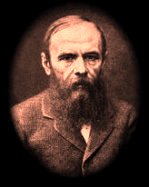| Seminar Programme |
| Select Bibliography |
| Bibliography |
| Further Reading/Viewing |
| Resources |
| Internet Addresses |
| Steven Earnshaw's Home Page |
Existentialism and Literature Crime and Punishment
|
 |
|
|
What is the book's narrative structure? E.g., the incorporation of Marmeladov's story; murder story; police procedural!; quest? What is the proximity of crime to punishment? At the end of chapter two Raskolnikov considers the idea that man is 'a beast'. What is the signficance of this? In what ways does the novel deal with a 'sense of self' - how does Raskolnikov struggle with it, does he wish to annihilate it or transform it? What constitutes 'freedom' in the novel? What is the nature of Raskolnikov's illness? How does the relationship between Sonia and Raskolnikov change? The book entertains the notion of a world without a God - what are the consequences for Raskolnikov and for Sonia (think in terms of their actions/lives)? List all the crimes and punishments in the novel (e.g. legal, psychological, moral, emotional etc.) Has Raskolnikov earned his redemption at the end, or is this a 'false' ending? How does Raskolnikov's dream of a plague (in the Epilogue) tie in with his previous thoughts and behaviour?
Web Sites Although by all appearances not updated since 1999, the best gateway site I can find is: http://www.kiosek.com/dostoevsky
|
Image by Dementy Shmarinov |